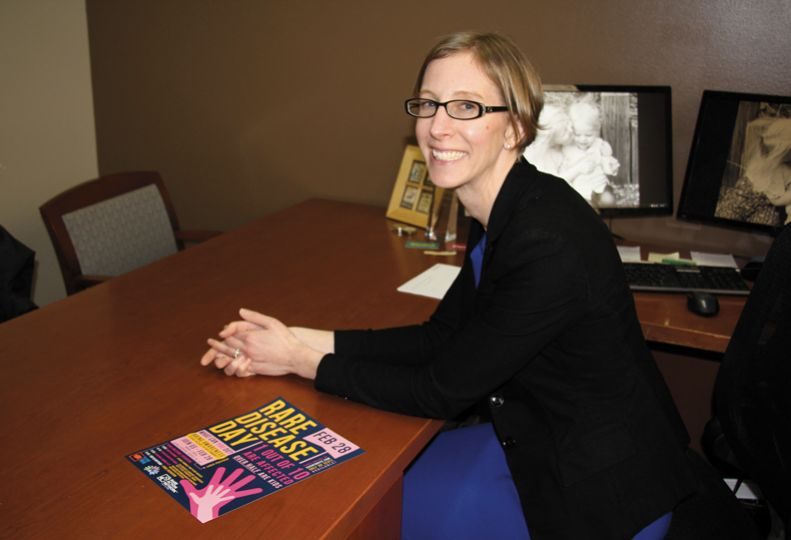
Home » Financial planning for caregivers
Financial planning for caregivers
McDirmid helps clients with special-needs dependents

March 15, 2018
According to the Danbury, Conn.-based National Organization for Rare Disorders, 30 million Americans—about 1 in 10—live with a rare disease, which is a disease that affects fewer than 200,000 people. There are about 7,000 known rare diseases, NORD says.
“Think of how many people are affected in Spokane, and that’s just rare diseases,” says Mary McDirmid, a special care planner and financial adviser.
McDirmid works in the Spokane office of MassMutual Northwest, located at 501 N. Riverpoint Blvd.
Last October, McDirmid earned The Chartered Special Needs Consultant designation from The American College of Financial Services and now assists with financial planning for families who have a dependent with special-needs.
McDirmid says it’s important for families with special need dependents to organize their finances.
Topics that McDirmid discusses with clients include paths to alleviate burdensome medical costs, different types of life insurance in case a caretaker passes away, and financial preparedness for emergency situations.
She says clients, who often are the parents of the special-needs dependent, usually fall into one of two categories. Either a client is “overly saving” for worst possible scenario situations or struggling fiscally to survive the burden of care-related debts.
To parents or guardians with a younger special-needs dependent, caretakers tend to think about financial planning when that individual turns 18, says McDirmid, because that’s the age at which a dependent starts receiving government disability income in his or her own name, rather than in the name of the caretakers.
Age 18 is often a turning point because caretakers either have to establish power of attorney or guardianship, “and those are very legal processes,” she says.
For people in those situations, McDirmid recommends contacting a special-needs lawyer to iron out a will. She says people should speak to that lawyer about special-needs trusts, why they’re important, and how to prevent assets from going to the special-needs dependent. McDirmid says it’s more difficult for people with special-needs who have assets in their own names to qualify for state and government benefits.
She also recommends that people research 529A accounts, also known as ABLE accounts. With the new federal tax law, she says people also now can rollover funds from 529 accounts, which are traditional college savings funds, to 529As, which can be used for college or special-needs services.
For older caregivers who are incorporating special-needs financial planning into their estate planning, the conversation becomes “way more complicated because they already have assets,” she says.
To be eligible for state or government funding for a special-needs dependent, those families can only have a certain volume of assets. The discussion turns from developing future assets to appropriately moving existing assets to ensure clients qualify for aid, McDirmid says. She suggests getting an elder law attorney involved early in the process.
Helping families with special-needs dependents is important to McDirmid, whose daughter, Ruth, was born in 2016 with tuberous sclerosis complex. A genetic disorder in which DNA is shorter than normal, TSC causes benign tumors to grow in different organs, she says. Ruth has them in her heart.
Since Ruth was born 21 months ago, she and McDirmid have attended 176 doctor appointments.
McDirmid is a representative for the Washington Rare Action Network, an advocacy organization run by NORD.
“My whole purpose (in that role) is to bring awareness to rare diseases,” she says.
On Wednesday, Feb. 28, she gave a presentation on rare disorders, specifically within the context of TSC, at Washington State University Spokane.
In addition to special care planning, McDirmid also works with small businesses and nonprofits.
For small businesses, which in this case refers to companies with fewer than 50 employees, McDirmid says, “I like that size. I feel I can be part of their team.”
She says she’s found that managers of such businesses often prefer to work with a single individual, who in this case would be McDirmid, for all of their benefit administrative needs.
In the nonprofit sector, she helps organizations with needs such as benefit maintenance. She also works with nonprofits to map out their current and future financial sustainability, she says.
Separately, McDirmid was awarded Rookie of the Year by MassMutual Northwest for 2017.
Although she joined in 2016, she says she qualified for the award because she had a child and was on maternity leave for three months in the prior year.
She says her Spokane-based managing sales partner, Thomas Jordan, and the Seattle-based general agent, Jim Cypher, didn’t think it was fair that she would miss out on the opportunity because of her pregnancy, a fact that’s important to McDirmid.
“I’m proud of myself, but I’m even more proud of MassMutual Northwest for recognizing that because I had a baby, that I’d miss out on that competition.”
Looking forward, she plans to apply for Leadership Spokane’s Class of 2019. A future potential goal might be to starting her own nonprofit while also working in the financial field, McDirmid says.
Separately, she says, “I want to send the message that you can do anything. Just start somewhere. … Just reach out to your resources, and just do it.”
MassMutual Northwest is a Seattle-based subsidiary of Springfield, Mass.-based Massachusetts Mutual Life Insurance Co., which also is marketed under the name MassMutual Financial Group.
MassMutual offers financial products and services, including life insurance, disability income insurance, retirement plans, and other employee benefits, a press release from the company says.
Latest News Special Report Banking & Finance
Related Articles
Related Products



